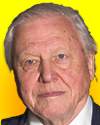 (source)
(source)
|
Sir David Attenborough
(8 May 1926 - )
English naturalist and broadcaster whose distinguished career in broadcasting spans more than a half-century. His Zoo Quest television series that began in 1952 ran for ten years, and was just the beginning of a life-long passion for presenting natural history television series from all parts of the world.
|
Science Quotes by Sir David Attenborough (117 quotes)
“It's absolutely clear that the function of the world is to declare the glory of God.” I thought, what does that sentence mean?!
— Sir David Attenborough
Quoting and reacting to a letter he saw in a newspaper about Stephen Hawking’s comments on the nonexistence of God. From 'Interview: Of Mind and Matter: David Attenborough Meets Richard Dawkins', The Guardian (11 Sep 2010).
“Life on Earth” [a 12-part TV series on evolution] was easier than “The Living Planet” because you have 2,000 years of narrative thrust built in. … You begin, say, with a giant jellyfish, then a fish with lungs which then became a frog. And all you have to do is say, “If you want to know what happens next, tune in next week.”
— Sir David Attenborough
Comparing two of his famed BBC TV natural history series, in Justine de Lacy, 'Around the World With Attenborough', New York Times (27 Jan 1985), Sec. 2, 25.
[A key to success] is being able to talk to camera without a teleprompter. … If you believe something and want to make clear what you are talking about, you ought to be able to articulate it without a teleprompter.
— Sir David Attenborough
From interview with Michael Bond, 'It’s a Wonderful Life', New Scientist (14 Dec 2002), 176, No. 2373, 48.
[Am I vegetarian?] No. If you understand about the natural world, we’re a part of the system and you can’t feed lions grass. But because we have the intelligence to choose… But we haven’t got the gut to allow us to be totally vegetarian for a start. You can tell by the shape of our guts and the shape of our teeth that we evolved to be omnivores. We aren’t carnivores like lions but neither are we elephants.
— Sir David Attenborough
Interview by Simon Gage in 'David Attenborough: I’m not an animal lover', Metro newspaper (29 Jan 2013, London).
[At my secondary school] if you were very bright, you did classics; if you were pretty thick, you did woodwork; and if you were neither of those poles, you did science. The number of kids in my school who did science because they were excited by the notion of science was pretty small. You were allocated to those things, you weren’t asked. This was in the late 1930s/early 1940s … Science was seen as something more remote and less to do with everyday life.
— Sir David Attenborough
From interview with Brian Cox and Robert Ince, in 'A Life Measured in Heartbeats', New Statesman (21 Dec 2012), 141, No. 5138, 32.
[Boundless curiosity.] That’s what being alive is about. I mean, it’s the fun of it all, making sense of it, understanding it. There’s a great pleasure in knowing why trees shed their leaves in winter. Everybody knows they do, but why? If you lose that, then you’ve lost pleasure.
— Sir David Attenborough
From interview with Sophie Elmhirst, 'I Think the BBC Has Strayed From the Straight and Narrow', New Statesman (10 Jan 2011), 140, No. 5035, 32.
[If I were to be reincarnated] I would come back as a sloth. Hanging from a tree, chewing leaves sounds great.
— Sir David Attenborough
From interview with Belinda Luscombe, '10 Questions', Time (12 Dec 2011), 178, No. 23, 72.
[My dream dinner guest is] Charles Darwin. It’s an obvious answer, but it’s the truth. Think of any problem and before you start theorising, just check up whether Charles Darwin mentioned it in one of those green books sitting on your shelf. Whether it’s earthworms, human gestures or the origin of species, the observations that man made are unbelievable. He touched on so many subjects. Then, Alexander von Humboldt, the last polymath. There was no aspect of the natural world that he wasn’t curious about or didn’t write about in Kosmos, an extraordinary book.
— Sir David Attenborough
From interview with Alice Roberts, 'Attenborough: My Life on Earth', The Biologist (Aug 2015), 62, No. 4, 16.
[Perfecting a script is] verbal carpentry. … That's what my speciality is, really, and always has been. If you can use four words instead of five that’s good.
— Sir David Attenborough
Two quotes from interview with Joe Shute, 'David Attenborough at 90: ‘I think about my mortality every day’', The Telegraph (29 Oct 2016).
[The problem I hope scientists will have solved by the end of the 21st century is:] The production of energy without any deleterious effects. The problem is then we’d be so powerful, there’d be no restraint and we’d continue wrecking everything. Solar energy would be preferable to nuclear. If you could harness it to produce desalination, you could make the Sahara bloom.
— Sir David Attenborough
From 'Interview: Of Mind and Matter: David Attenborough Meets Richard Dawkins', The Guardian (11 Sep 2010).
[Watching natural history programs] brings a solace you can’t describe in words. It’s because we’re part of it fundamentally…. In moments of great grief, that’s where you look and immerse yourself. You realise you are not immortal, you are not a god, you are part of the natural world and you come to accept that.
— Sir David Attenborough
Reflecting on the letters he received from newly bereaved people. While his series are running on TV, in dozens of letters daily (comprising the majority of the correspondence), they tell him that the only things they can face in their darkest moments are his natural-history programmes. From interview with Joe Shute, 'David Attenborough at 90: ‘I think about my mortality every day’', The Telegraph (29 Oct 2016).
A hundred years ago, there were one-and-a-half billion people on Earth. Now, over six billion crowd our fragile planet. But even so, there are still places barely touched by humanity.
— Sir David Attenborough
As quoted in Jack Shepherd, "David Attenborough: 15 of the naturalist’s best quotes: In celebration of his 94th birthday", Independent (8 May 2017), on independent.co.uk website.
A physicist will tell me that this armchair is made of vibrations and that it’s not really here at all. But when Samuel Johnson was asked to prove the material existence of reality, he just went up to a big stone and kicked it. I'm with him.
— Sir David Attenborough
Commenting on string theory. From 'Interview: Of Mind and Matter: David Attenborough Meets Richard Dawkins', The Guardian (11 Sep 2010).
A species can only thrive when everything else around it thrives too. … If we take care of nature, nature will take care of us. It’s now time for our species to stop simply growing, to establish a life on our planet in balance with nature. To start to thrive.
— Sir David Attenborough
From narration to Netflix TV program, A Life on Our Planet: My Witness Statement and a Vision for the Future (4 Oct 2020).
About 70 or 80 men jumped onto the track, brandishing knives and spears. To say I was alarmed is to put it mildly… I walked towards this screaming horde of men, I stuck out my hand, and I heard myself say ‘good afternoon.’
— Sir David Attenborough
As quoted in Jack Shepherd, "David Attenborough: 15 of the naturalist’s best quotes: In celebration of his 94th birthday", Independent (8 May 2017), on independent.co.uk website.
All programs on jungles had previously been filmed from the bottom up, with dead leaves and a dead animal or two. Suddenly, I realized that it’s at the top that everything is blossoming and populating and having a ball. So, I wrote it from the top. The director happened to be a young, ludicrously athletic fellow who decided to film me up a 200-foot kapok tree on a rope. Sheer vanity from elder to younger led me to say yes. At 5 feet off the ground it’s interesting. At 10 feet you say, “Hmmm a bit high.” At 50 feet it’s exhausting and at 90 feet terrifying because you realize that no one can get to you if you decide you don’t like it. To get down you have to retie all the ropes. You don’t just come down. I was so petrified I had forgotten I’d left my radio on, so everyone down below was falling about with laughter listening to me praying and swearing to myself in terror. By the time I came down I had recovered my cool and was going around saying it had all been fine without realizing they’d all heard me.
— Sir David Attenborough
In Justine de Lacy, 'Around the World With Attenborough', New York Times (27 Jan 1985), Sec. 2, 25.
An understanding of the natural world and what’s in it is a source of not only a great curiosity but great fulfilment.
— Sir David Attenborough
As quoted in Jack Shepherd, "David Attenborough: 15 of the naturalist’s best quotes: In celebration of his 94th birthday", Independent (8 May 2017), on independent.co.uk website.
Anyone who believes in indefinite growth in anything physical, on a physically finite planet, is either mad—or an economist.
— Sir David Attenborough
Expressing concern about ecosystems ruined by the arrival of man. As quoted by Philip Maughan, 'Sixty Years of Attenborough Through the Eyes of the New Statesman', New Statesman (21 Dec 2012), 141, No. 5138, 34. The quote came from Attenborough writing in an April 2013 issue of the same periodical.
Biofuels may be palliative in the short term in terms of greener energy. But in the long term we are going to run out of space to grow food, which is more important than finding alternative ways to power Rolls-Royces and superjets.
— Sir David Attenborough
From interview with Nick Harding in 'Sir David Attenborough: ‘This awful summer? We've only ourselves to blame…’' The Independent (July 2012). On the website of independent.co.uk online.
Bringing nature into the classroom can kindle a fascination and passion for the diversity of life on earth and can motivate a sense of responsibility to safeguard it.
— Sir David Attenborough
As quoted, without source, in Kate Ng, 'David Attenborough turns 95: His best quotes on nature, sustainability and humankind', Independent (8 May 2021).
Education is not a matter of getting facts and sowing them within brains, but that it is an attitude of mind that you teach children to find out for themselves
— Sir David Attenborough
Interview with David Barrett, 'Attenborough: Children Don’t Know Enough About Nature', Daily Telegraph (17 Apr 2011).
Ever since we arrived on this planet as a species, we’ve cut them down, dug them up, burnt them and poisoned them. Today we’re doing so on a greater scale than ever.
— Sir David Attenborough
As quoted in Jack Shepherd, "David Attenborough: 15 of the naturalist’s best quotes: In celebration of his 94th birthday", Independent (8 May 2017), on independent.co.uk website.
Every 10 years, an area the size of Britain disappears under a jungle of concrete.
— Sir David Attenborough
As quoted from BBC TV series, Planet Earth II in Joe Shute, 'David Attenborough at 90: ‘I think about my mortality every day’', The Telegraph (29 Oct 2016).
Forests are a fundamental component of our planet’s recovery. They are the best technology nature has for locking away carbon. And they are centers of biodiversity. Again, the two features work together. The wilder and more diverse forests are, the more effective they are at absorbing carbon from the atmosphere
— Sir David Attenborough
From narration to Netflix TV program, A Life on Our Planet: My Witness Statement and a Vision for the Future (4 Oct 2020).
Homo sapiens is a compulsive communicator. Look at the number of people you see walking around talking on mobile phones. We seem to have an infinite capacity for communicating and being communicated with. I’m not sure how admirable it is, but it certainly demonstrates that we are social organisms.
— Sir David Attenborough
From interview with Michael Bond, 'It’s a Wonderful Life', New Scientist (14 Dec 2002), 176, No. 2373, 48.
How far do you go to preserve individual human life? … I mean, what are we to do with the NHS? How can you put a value in pounds, shillings and pence on an individual’s life? There was a case with a bowel cancer drug – if you gave that drug, which costs several thousand pounds, it continued life for six weeks on. How can you make that decision?
— Sir David Attenborough
Answering “What is the most difficult ethical dilemma facing science today?” NHS is the British National Health Service, which has the difficulty of how to best allocate limited funding resources. From 'Interview: Of Mind and Matter: David Attenborough Meets Richard Dawkins', The Guardian (11 Sep 2010).
I am a naturalist rather than a scientist. Simply looking at a flower or a frog has always seemed to me to be just about the most interesting thing there is. Others say human beings are pretty interesting, which they are, but as a child you’re not interested in Auntie Flo’s psychology; you’re interested in how a dragonfly larva turns into a dragonfly.
— Sir David Attenborough
From 'Interview: Of Mind and Matter: David Attenborough Meets Richard Dawkins', The Guardian (11 Sep 2010).
I am besotted with birds of paradise. Watching them display is the most extraordinary thing I’ve ever seen in my life.
— Sir David Attenborough
From interview with Alice Roberts, 'Attenborough: My Life on Earth', The Biologist (Aug 2015), 62, No. 4, 16.
I can’t pretend that I got involved with filming the natural world fifty years ago because I had some great banner to carry about conservation — not at all, I always had a huge pleasure in just watching the natural world and seeing what happens.
— Sir David Attenborough
As quoted in Jack Shepherd, "David Attenborough: 15 of the naturalist’s best quotes: In celebration of his 94th birthday", Independent (8 May 2017), on independent.co.uk website.
I don’t like rats but there’s not much else I don’t like. The problem with rats is they have no fear of human beings, they’re loaded with foul diseases, they would run the place given half the chance…
— Sir David Attenborough
Interview by Simon Gage in 'David Attenborough: I’m not an animal lover', Metro newspaper (29 Jan 2013, London).
I don’t run a car, have never run a car. I could say that this is because I have this extremely tender environmentalist conscience, but the fact is I hate driving.
— Sir David Attenborough
As quoted in Jack Shepherd, "David Attenborough: 15 of the naturalist’s best quotes: In celebration of his 94th birthday", Independent (8 May 2017), on independent.co.uk website.
I grew up in Leicestershire, in Leicester, which is on the Jurassic, and it’s full of lovely fossils. Ammonites, belemnites, brachiopods—very beautiful. How did they get there, in the middle of the rocks, in the middle of England, and so on? And I had the collecting bug, which I still have, actually, which is the basis of so much of natural history, really, and so much of science. And so collecting all these things, and discovering what they were, and how they lived, and when they had lived, and all that, was abiding fascination to me from the age of I suppose about eight. And I still feel that way, actually.
— Sir David Attenborough
Speaking about fossils that first inspired his love of natural history. In video by Royal Society of Biology, 'Sir David Attenborough, Biology: Changing the World Interview,' published on YouTube (13 Feb 2015).
I have enough to do in life. I am beavering away as hard as I can for most of my waking hours and the idea that I have to keep telling people what I am doing and catching up with what they are doing is absurd.
— Sir David Attenborough
Expressing no interest in social media as a broadcasting extension. From interview with Nick Harding in 'Sir David Attenborough: ‘This awful summer? We've only ourselves to blame…’' The Independent (July 2012). On the website of independent.co.uk online.
I have never really had dreams to fulfil…. You just want to go on looking at these ecosystems and trying to understand them and they are all fascinating. To achieve a dream suggests snatching a prize from the top of a tree and running off with it, and that’s the end of it. It isn’t like that. … What you are trying to achieve is understanding and you don’t do that just by chasing dreams.
— Sir David Attenborough
From interview with Michael Bond, 'It’s a Wonderful Life', New Scientist (14 Dec 2002), 176, No. 2373, 52.
I have no doubt that the fundamental problem the planet faces is the enormous increase in the human population. You see it overrunning everywhere. Places that were very remote when I went there 50 years ago are now overrun.
— Sir David Attenborough
From interview with Michael Bond, 'It’s a Wonderful Life', New Scientist (14 Dec 2002), 176, No. 2373, 48.
I just wish the world was twice as big and half of it was still unexplored.
— Sir David Attenborough
Epigraph Bruce L. Smith, Stories from Afield: Adventures with Wild Things in Wild Places (2016), Chap. 16, citing the TV program Life on Earth.
I often get letters … from people who say … I never give credit to the almighty power that created nature. … I reply … “Well, it’s funny that the people, when they say that this is evidence of the Almighty, always quote beautiful things … orchids and hummingbirds and butterflies and roses.” But I always have to think too of a little boy sitting on the banks of a river in west Africa who has a worm boring through his eyeball, turning him blind before he’s five years old. And I … say, “Well, presumably the God you speak about created the worm as well,” and now, I find that baffling to credit a merciful God with that action. And therefore it seems to me safer to show things that I know to be truth, truthful and factual, and allow people to make up their own minds about the moralities of this thing, or indeed the theology of this thing.
— Sir David Attenborough
From BBC TV, Life on Air (2002).
I remember asking an adult, “What goes on inside a cocoon?” and he said, “The caterpillar is totally broken down into a kind of soup. And then it starts again.” And I remember saying, “That can’t be right.” As a procedure, you can’t imagine how it evolved.
— Sir David Attenborough
From 'Interview: Of Mind and Matter: David Attenborough Meets Richard Dawkins', The Guardian (11 Sep 2010).
I think every child born on this planet up to the age of about four or five is fascinated by the natural world. If they aren’t it’s because we deprive them of the opportunity. Over half the world’s population is urbanised and the thought that some children may grow up not looking at a pond or knowing how plants grow is a terrible thing. If you lose that delight and joy and intoxication, you’ve lost something hugely precious.
— Sir David Attenborough
From interview with Alice Roberts, 'Attenborough: My Life on Earth', The Biologist (Aug 2015), 62, No. 4, 14.
I think understanding animals enriches your pleasure, finding out how to understand them is the great pleasure. I never stop reading books about man and animals; they’re always full of interesting stuff. I’ll turn the page and my eyes will be popping out.
— Sir David Attenborough
Speaking at the launch of “David Attenborough’s Natural Curiosities” on Watch, the BBC TV channel (2 Feb 2015). As quoted in 'Sir David Attenborough Shocked By Rat on the Toilet' on femalefirst.co.uk website.
I think understanding animals enriches your pleasure, finding out how to understand them is the great pleasure. I never stop reading books about man and animals; they’re always full of interesting stuff. I’ll turn the page and my eyes will be popping out.
— Sir David Attenborough
Speaking at the launch of “David Attenborough’s Natural Curiosities” on Watch, the BBC TV channel (2 Feb 2015). As quoted in 'Sir David Attenborough Shocked By Rat on the Toilet' on femalefirst.co.uk website.
I thought existing zoo programmes were really not doing animals justice. They all looked like oddities, like bizarre stage things, when, really, in their own environment, they are wonderful answers to very complex questions.
— Sir David Attenborough
Explaining his motivation for his earliest groundbreaking Zoo Quest nature TV series featuring on location filming. From interview with Alice Roberts, 'Attenborough: My Life on Earth', The Biologist (Aug 2015), 62, No. 4, 15.
I’m a lapel-clutcher by nature. I’m always running up to people and shaking them and saying, “Have you heard?” I believe man has a compulsion to communicate and his evolutionary success is due to it. And I’ve got it. I relive the pleasure I found in it when I tell someone about it.
— Sir David Attenborough
In Justine de Lacy, 'Around the World With Attenborough', New York Times (27 Jan 1985), Sec. 2, 25.
I’m not an animal lover if that means you think things are nice if you can pat them, but I am intoxicated by animals.
— Sir David Attenborough
Interview by Simon Gage in 'David Attenborough: I’m not an animal lover', Metro newspaper (29 Jan 2013, London).
If I had been starting out now, I would be behind the camera.
— Sir David Attenborough
Referring to his TV nature documentaries. From interview with Nick Harding in 'Sir David Attenborough: ‘This awful summer? We've only ourselves to blame…’' The Independent (July 2012). On the website of independent.co.uk online.
If I were working in astrophysics I would find it quite hard to explain to people what I was doing. Natural history is a pretty easy thing to explain. It does have its complexities, but nowhere do you speak about things that are outside people’s experience. You might speak about a species that is outside their experience, but nothing as remote as astrophysics.
— Sir David Attenborough
From interview with Michael Bond, 'It’s a Wonderful Life', New Scientist (14 Dec 2002), 176, No. 2373, 48.
If my legs give up, they give up. But in that case I could sit and do programmes about amoebas—Micro Monsters, perhaps. What else do you want to do? Sit by the fire and read yesterday’s newspaper?
— Sir David Attenborough
Stating his intent to never retire. Reported by Adam Lusher in 'Sir David Attenborough', Daily Mail (28 Feb 2014).
If we [humans] disappeared overnight, the world would probably be better off.
— Sir David Attenborough
Interview about Life In The Undergrowth (book and TV series on insects), The Daily Telegraph (12 Nov 2005).
If we and the rest of the backboned animals were to disappear overnight, the rest of the world would get on pretty well. But if [the invertebrates] were to disappear, the world’s ecosystems would collapse. disappear, the land’s ecosystems would collapse. The soil would lose its fertility. Many of the plants would no longer be pollinated. Lots of animals, amphibians, reptiles, birds, mammals would have nothing to eat. And our fields and pastures would be covered with dung and carrion.
— Sir David Attenborough
From BBC TV series Life in the Undergrowth (2005). As cited in Simon Barnes, History of the World in 100 Animals (2020), end of Chap. 72.
If we continue on our current course, the damage that has been the defining feature of my lifetime will be eclipsed by the damage coming in the next. … Science predicts that were I born today, I would be witness to the 2030s—The Amazon Rainforest, cut down until it can no longer produce enough moisture, degrades into a dry savannah, bringing catastrophic species loss—and altering the global water cycle.
— Sir David Attenborough
From narration to Netflix TV program, A Life on Our Planet: My Witness Statement and a Vision for the Future (4 Oct 2020).
If you want to achieve conservation, the first thing you have to do is persuade people that the natural world is precious, beautiful, worth saving and complex. If people don’t understand that and don’t believe that in their hearts, conservation doesn't stand a chance. That’s the first step, and that is what I do.
— Sir David Attenborough
From interview with Michael Bond, 'It’s a Wonderful Life', New Scientist (14 Dec 2002), 176, No. 2373, 48.
If you’re telling a story, it’s very tempting to personalise an animal. To start with, biologists said this fascination with one individual was just television storytelling. But they began to realise that, actually, it was a new way to understand behaviour–following the fortunes of one particular animal could be very revealing and have all kinds of implications in terms of the ecology and general behaviour of the animals in that area.
— Sir David Attenborough
From interview with Alice Roberts, 'Attenborough: My Life on Earth', The Biologist (Aug 2015), 62, No. 4, 15.
In a great number of programmes I’m not a scientist—I’m simply a commentator. So I should claim no virtue for the fact that [people] seem to trust me, if that is indeed the case. It’s simply that I very seldom talk about something they can’t see. If I say a lion is attacking a wildebeest, they can see it is; if I were to say something about a proton, it might be different.
— Sir David Attenborough
As quoted in Bill Parry, 'Sir David Attenborough in Conversation', The Biologist (Jun 2010), 57, No. 2, 93.
In my position you can’t go out and just say, “I think,” because it’s a very serious thing. So if you get up and say climate is changing because of CO2 emissions, you better bloody well be right.
— Sir David Attenborough
As quoted in interview with Joe Shute, 'David Attenborough at 90: ‘I think about my mortality every day’', The Telegraph (29 Oct 2016). Note: Elsewhere, Attenborough says that the evidence of climate change is now, in fact, “ironclad.”
In my view, the proper attitude of a public-service broadcaster is that it should attempt to cover as broad as possible a spectrum of human interest and should measure success by the width of those views. There shouldn’t be all that large a number of gaps in the spectrum; and a major element in the spectrum is scientific understanding. The fact that it doesn’t necessarily get as big an audience as cookery is of no consequence.
— Sir David Attenborough
From interview with Brian Cox and Robert Ince, in 'A Life Measured in Heartbeats', New Statesman (21 Dec 2012), 141, No. 5138, 33.
In the Anthropocene, the time of humans[,] … rocks … are forming today. Not only will they contain fewer species than the rocks that preceded them but they will contain markers that are completely new—fragments of plastic, plutonium from nuclear activity, and a worldwide distribution of the bones of domesticated chickens.
— Sir David Attenborough
In 'Conclusion', A Life on Our Planet: My Witness Statement and a Vision for the Future (2020), 215.
In the 1940s when I did my natural sciences degree in zoology it was very much laboratory-based. … I was not keen on the idea of spending the rest of my life in the lab. I also don’t think I would have been particularly good at it. I don't think I have as analytical a mind or the degree of application that one would need to become a first-rate research scientist.
— Sir David Attenborough
From interview with Michael Bond, 'It’s a Wonderful Life', New Scientist (14 Dec 2002), 176, No. 2373, 48.
In the early days of dealing with climate change, I wouldn’t go out on a limb one way or another, because I don’t have the qualifications there. But I do have the qualifications to measure the scientific community and see what the consensus is about climate change. I remember the moment when I suddenly thought it was incontrovertible. There was a lecture given by a distinguished American expert in atmospheric science and he showed a series of graphs about the temperature changes in the upper atmosphere. He plotted time against population growth and industrialisation. It was incontrovertible, and once you think it’s really totally incontrovertible, then you have a responsibility to say so.
— Sir David Attenborough
From interview with Brian Cox and Robert Ince, in 'A Life Measured in Heartbeats', New Statesman (21 Dec 2012), 141, No. 5138, 32.
In the end, after a lifetime’s exploration of the living world, I’m certain of one thing. This is not about saving our planet… it’s about saving ourselves.
— Sir David Attenborough
From narration to Netflix TV program, A Life on Our Planet: My Witness Statement and a Vision for the Future (4 Oct 2020).
In the past, you wouldn’t have had any problem in getting a countryman to explain the difference between a blackbird and a song thrush, but you might have that difficulty with a kid now. Equally, if you asked a chap about gorillas in the 19th-century, he wouldn’t have heard of the creatures, but today an urban boy knows all about them.
— Sir David Attenborough
Explaining how the success of nature documentaries may result in children who know more about gorillas than the wildlife in their own gardens. As reported by Adam Lusher in 'Sir David Attenborough', Daily Mail (28 Feb 2014).
It is that range of biodiversity that we must care for—the whole thing—rather than just one or two stars.
— Sir David Attenborough
From BBC interview. As cited in Bruce L. Smith, Stories from Afield: Adventures with Wild Things in Wild (2016), 185.
It is very difficult not to be excited by 10,000 king penguins.
— Sir David Attenborough
From interview with Michael Bond, 'It’s a Wonderful Life', New Scientist (14 Dec 2002), 176, No. 2373, 48.
It seems to me that the natural world is the greatest source of excitement; the greatest source of visual beauty, the greatest source of intellectual interest. It is the greatest source of so much in life that makes life worth living.
— Sir David Attenborough
As quoted in Jack Shepherd, "David Attenborough: 15 of the naturalist’s best quotes: In celebration of his 94th birthday", Independent (8 May 2017), on independent.co.uk website.
It wasn’t the finches that put the idea [of natural selection] in Darwin’s head, it was the tortoises. The reason he didn’t use the tortoises [in writing On the Origin of Species] was that, when he got back, he found he didn’t have localities on the tortoise specimens. Here the great god, the greatest naturalist we have records of, made a mistake. His fieldwork wasn’t absolutely perfect.
— Sir David Attenborough
From interview with Brian Cox and Robert Ince, in 'A Life Measured in Heartbeats', New Statesman (21 Dec 2012), 141, No. 5138, 33.
It’s important natural history isn’t seen as something that is “out there”, which you have to travel to. It’s right there in your garden. Public awareness of the natural history of the world as a whole has never been as great. But it’s important to know about species close to home.
— Sir David Attenborough
As reported by Adam Lusher in 'Sir David Attenborough', Daily Mail (28 Feb 2014).
It’s never been more important for us to understand the effects of biodiversity loss… only if we do that, will we have any hope of averting disaster.
— Sir David Attenborough
From BBC TV program Extinction: The Facts (13 Sep 2020). As quoted in press release on a BBC Media Centre web page.
It’s surely our responsibility to do everything within our power to create a planet that provides a home not just for us, but for all life on Earth.
— Sir David Attenborough
Closing words of BBC TV Series, Planet Earth II (2016).
Kids like their fossils. I’ve taken my godson fossil-hunting and there’s nothing more magical than finding a shiny shell and knowing you’re the first person to have seen it for 150 million years.
— Sir David Attenborough
As reported by Adam Lusher in 'Sir David Attenborough', Daily Mail (28 Feb 2014).
Looking down on this great metropolis, the ingenuity with which we continue to reshape our planet is very striking. It’s also sobering. It reminds me of just how easy it is for us to lose our connection with the natural world. Yet it is on this connection that the future of both humanity and the natural world will depend.
— Sir David Attenborough
From BBC TV series Planet Earth II, while at London from the top of a skyscraper. As quoted in interview with Joe Shute, 'David Attenborough at 90: ‘I think about my mortality every day’', The Telegraph (29 Oct 2016).
Many individuals are doing what they can. But real success can only come if there is a change in our societies and in our economics and in our politics.
— Sir David Attenborough
About climate change. As quoted, without source, in Kate Ng, 'David Attenborough turns 95: His best quotes on nature, sustainability and humankind', Independent (8 May 2021).
Nature doesn’t sit still. Things and individuals are changing, dying and new things are coming. They’re all stories.
— Sir David Attenborough
From interview with Joe Shute, 'David Attenborough at 90: ‘I think about my mortality every day’', The Telegraph (29 Oct 2016).
No, not a feminist. I’m a humanist. I’m neither one side nor the other. It’s about the human being. And wanting human beings to be better off so they don’t view children as an insurance for the future.
— Sir David Attenborough
As quoted in Jack Shepherd, "David Attenborough: 15 of the naturalist’s best quotes: In celebration of his 94th birthday", Independent (8 May 2017), on independent.co.uk website.
Now, over half of us live in an urban environment. My home, too, is here in the city of London. Looking down on this great metropolis, the ingenuity with which we continue to reshape the surface of our planet is very striking. It’s also very sobering, and reminds me of just how easy it is for us to lose our connection with the natural world.
— Sir David Attenborough
In closing remarks of BBC TV Series, Planet Earth II (2016).
One [of the most exciting moment of my career] would be when I first dived on a coral reef and I was able to move among a world of unrevealed complexity.
— Sir David Attenborough
From 'Interview: Of Mind and Matter: David Attenborough Meets Richard Dawkins', The Guardian (11 Sep 2010).
One of the great achievements of the 1950s and 1960s was a [TV] series called Your Life in Their Hands, which dealt with medical science. It presented the scientific evidence for the connection between tobacco and cancer, against the entrenched opposition, all of which you can quite easily imagine. … The “television doctor” … presented the evidence of the connection between the two over and over again on television. A lot of people tried to stop it, but he carried on. It ruined his career, I suspect, in the medical sense, but he stuck to his guns. It’s one of early television’s badges of honour.
— Sir David Attenborough
From interview with Brian Cox and Robert Ince, in 'A Life Measured in Heartbeats', New Statesman (21 Dec 2012), 141, No. 5138, 32.
People are not going to care about animal conservation unless they think that animals are worthwhile.
— Sir David Attenborough
…...
People must feel that the natural world is important and valuable and beautiful and wonderful and an amazement and a pleasure.
— Sir David Attenborough
As quoted in Jack Shepherd, "David Attenborough: 15 of the naturalist’s best quotes: In celebration of his 94th birthday", Independent (8 May 2017), on independent.co.uk website.
People say Richard Feynman had one of these extraordinary minds that could grapple with ideas of which I have no concept. And you hear all the ancillary bits—like he was a good bongo player—that make him human. So I admire this man who could not only deal with string theory but also play the bongos. But he is beyond me. I have no idea what he was talking of.
— Sir David Attenborough
From 'Interview: Of Mind and Matter: David Attenborough Meets Richard Dawkins', The Guardian (11 Sep 2010). When asked, “Which living scientist do you most admire, and why?”, Attenborough first replied, “I don’t know.” He continued with the quote above. [String theory pioneer John H. Schwarz of Caltech, in a 2018 interview said that Feynman, who died in 1988, was also at Caltech at the time of the 1984 to 1985 breakthroughs in understanding superstring theory; but Feynman held a “skepticism of superstring theory … based mostly on the concern that it could not be tested experimentally.”]
Plants are hunters, murderers, sexual deceivers, empire builders. All sorts of things.
— Sir David Attenborough
Answering the reporter’s question whether he thought plants are passive life forms, doing not much of anything but growing. In Nadine Brozan, 'Chronicle: Bringing the Secret Life of Plants to Light', New York Times (9 Oct 1995), Sec. A, 13. Attenborough was on a lecture tour about The Private Life of Plants, the title of his book and a six-part BBC TV series.
Plants have all the same kinds of problems of survival that animals have. … They must find food, a place to live, a mate and they must get on with their neighbors and fight to survive.
— Sir David Attenborough
In Nadine Brozan, 'Chronicle: Bringing the Secret Life of Plants to Light', New York Times (9 Oct 1995), Sec. A, 13. Attenborough was on a lecture tour about The Private Life of Plants, the title of his book and a six-part BBC TV series.
Q: Which place has special childhood memories for you?
A: Charnwood Forest, Leicestershire.
Q: In which place do you feel most “at home”?
A: Richmond, Surrey, where I live near Richmond Hill.
Q: In which place have you felt ill at ease or uncomfortable?
A: The Democratic Republic of the Congo.
Q: Which place that you have visited has for you a “tingle factor?”
A: New Guinea.
Q: Which place that you have visited has given you most hope about the future?
A: A primary school.
Q: Which place would you like to revisit?
A: Tuscany.
A: Charnwood Forest, Leicestershire.
Q: In which place do you feel most “at home”?
A: Richmond, Surrey, where I live near Richmond Hill.
Q: In which place have you felt ill at ease or uncomfortable?
A: The Democratic Republic of the Congo.
Q: Which place that you have visited has for you a “tingle factor?”
A: New Guinea.
Q: Which place that you have visited has given you most hope about the future?
A: A primary school.
Q: Which place would you like to revisit?
A: Tuscany.
— Sir David Attenborough
In 'My Places: David Attenborough', Teaching Geography, (Summer 2008), 33, No. 2, 86.
The beauty of natural history programmes is that you can be straightforward and fascinate the 7s and the 70s. If you just present it as it is, all kinds of people of all ages and all educational backgrounds love it. That’s the joy of natural history—it’s a godsend for blokes like me.
— Sir David Attenborough
In Rowan Hooper, 'One Minute With… David Attenborough', New Scientist (2 Feb 2013), 217, No. 2902, 25.
The biggest animal that has ever lived on our planet: a blue whale. … It’s far bigger than even the biggest dinosaur. Its tongue weighs as much as an elephant. Its heart is the size of a car. And some of its blood vessels are so wide that you could swim down them.
— Sir David Attenborough
Narration from 'Introduction' of the BBC TV series The Blue Planet (2001), Ep. 1. Text accompanies 'Blue whale breach', video clip on BBC website.
The fact is that no species has ever had such wholesale control over anything on earth, living or dead, as we now have. That lays upon us, whether we like it or not, an awesome responsibility. In our hands now lies not only our own future but that of all other living creatures with whom we share the earth.
— Sir David Attenborough
As quoted, without source, in Kate Ng, 'David Attenborough turns 95: His best quotes on nature, sustainability and humankind', Independent (8 May 2021).
The great heroes and heroines of our society are of course the teachers, and in particular the teachers of kids in their first years. Once a child has been shown what the natural world is, it will live with them forever.
— Sir David Attenborough
As quoted in Alexandra Pope, 'Attenborough Awarded RCGS Gold', Canadian Geographic, (May 2017), 137, No. 3, 73.
The living world is a unique and spectacular marvel. Billions of individuals, and millions of kinds of plants and animals …. Working together to benefit from the energy of the sun and the minerals of the earth. Leading lives that interlock in such a way that they sustain each other. We rely entirely on this finely tuned life-support machine. And it relies on its biodiversity to run smoothly. Yet the way we humans live on Earth now is sending biodiversity into a decline.
— Sir David Attenborough
From introductory narration to Netflix TV program, A Life on Our Planet: My Witness Statement and a Vision for the Future (4 Oct 2020).
The one [favourite fictional scientist] I can think of is Conan Doyle’s Professor Challenger, but he was a very irascible character and not a good role model.
— Sir David Attenborough
From 'Interview: Of Mind and Matter: David Attenborough Meets Richard Dawkins', The Guardian (11 Sep 2010).
The question is, are we happy to suppose that our grandchildren may never be able to see an elephant except in a picture book?
— Sir David Attenborough
As quoted in Jack Shepherd, "David Attenborough: 15 of the naturalist’s best quotes: In celebration of his 94th birthday", Independent (8 May 2017), on independent.co.uk website.
The real problem is not the loss of a particular species but the loss of particular kinds of environments. … When you lose a big, dramatic species like the whooping crane, you don’t notice that you are also losing other plants and animals. … We are only putting Band-Aids on until we recognize we need to be protecting environments, not just endangered species.
— Sir David Attenborough
In Philip Shabecoff, 'Further Safeguards Urged For Endangered Species', New York Times (14 Mar 1985), B9. Attenborough was in America to testify before a Congressional subcommittee considering the reauthorization of the Endangered Species Act (originally passed in 1973).
The tiny creatures of the undergrowth were the first creatures of any kind to colonise the land. They established the foundations of the land’s ecosystems and were able to transcend the limitations of their small size by banding together in huge communities of millions.
— Sir David Attenborough
From BBC TV series Life in the Undergrowth (2005), as quoted in BBC press release (10 Oct 2005).
The whole biological community needs to be talking to one another so that people can get a comprehension of the turmoil in which our planet is involved at the moment, which is a biological turmoil above anything else.
— Sir David Attenborough
In short extract from interview with Alice Roberts for the Biology: Changing the World project, 'Attenborough: The Earth is in “Biological Turmoil”', The Biologist (Apr/May 2015), 62, No. 2, 4.
The whole of life is coming to terms with yourself and the natural world. Why are you here?
— Sir David Attenborough
Unverified — Contact Webmaster if you know the source.
There are some four million different kinds of animals and plants in the world. Four million different solutions to the problems of staying alive.
— Sir David Attenborough
As quoted in Jack Shepherd, "David Attenborough: 15 of the naturalist’s best quotes: In celebration of his 94th birthday", Independent (8 May 2017), on independent.co.uk website.
There are three times as many people in the world as when I started making television programs 56 years ago. It is frightening. We can’t go on as we have been. We are seeing the consequences in terms of ecology, pollution, space and food production.
— Sir David Attenborough
On becoming a patron of the Optimum Population Trust, as reported in The Times (14 Apr 2009).
There is a huge disconnect. Those living in the most urbanised areas don’t see a wild thing from one day to the next—unless it’s a pigeon or a rat. If you lose the connection with nature, you lose a source of great pleasure.
— Sir David Attenborough
Lamenting Britain’s urbanized population is increasingly separated from the natural world. As reported by Adam Lusher in 'Sir David Attenborough', Daily Mail (28 Feb 2014).
There is no question that climate change is happening; the only arguable point is what part humans are playing in it. … Personally I would be absolutely astounded if population growth and industrialisation and all the stuff we are pumping into the atmosphere hadn’t changed the climatic balance. Of course it has. There is no valid argument for denial.
— Sir David Attenborough
From interview with Nick Harding in 'Sir David Attenborough: ‘This awful summer? We've only ourselves to blame…’' The Independent (July 2012). On the website of independent.co.uk online.
Though rich in places, Britain as a whole is one of the most nature-depleted countries in the world.
— Sir David Attenborough
From narration to BBC TV documentary, 'Saving Our Wild Isles', Wild Isles (2023), Ep. 6. As quoted in Barbara Ellen, 'Review: The week in TV: Wild Isles', The Guardian, (19 Mar 2023), on theguardian.com website.
To restore stability to our planet, therefore, we must restore its biodiversity, the very thing we have removed. It is the only way out of this crisis that we ourselves have created. We must rewild the world!
— Sir David Attenborough
As quoted, without source, in Kate Ng, 'David Attenborough turns 95: His best quotes on nature, sustainability and humankind', Independent (8 May 2021).
To suggest that God specifically created a worm to torture small African children is blasphemy as far as I can see. The Archbishop of Canterbury doesn’t believe that.
— Sir David Attenborough
From Interview with Simon Gage, 'David Attenborough: I’m not an animal lover', in Metro newspaper (29 Jan 2013, London).
We are a plague on the Earth. It’s coming home to roost over the next 50 years or so. It’s not just climate change; it’s sheer space, places to grow food for this enormous horde. Either we limit our population growth or the natural world will do it for us, and the natural world is doing it for us right now.
— Sir David Attenborough
As quoted and cited from Radio Times in Louise Gray, 'David Attenborough - Humans are Plague on Earth', The Telegraph (22 Jan 2013).
We are at a unique stage in our history. Never before have we had such an awareness of what we are doing to the planet, and never before have we had the power to do something about that. Surely we all have a responsibility to care for our blue planet. The future of humanity and indeed, all life on earth, now depends on us.
— Sir David Attenborough
As quoted, without source, in Kate Ng, 'David Attenborough turns 95: His best quotes on nature, sustainability and humankind', Independent (8 May 2021).
We tried to transform Tarmac playgrounds into places with pools, and earth where children could grow things. Now the Government is saying we need more classroom space so the schools are building them on the very nature habitats we’ve been working to provide.
— Sir David Attenborough
Despairing at the loss of green spaces at schools. He was patron of the charity Learning Through Landscapes which worked to create green spaces. As reported by Adam Lusher in 'Sir David Attenborough', Daily Mail (28 Feb 2014).
We’re suffocating ourselves by cutting things down. And the awful thing is that the knowledge is there. Fifty years ago when we exterminated things, we did it without realising. Now there’s plenty of evidence of what it is we’re doing, and yet we keep on doing it.
— Sir David Attenborough
In Rowan Hooper, 'One Minute With… David Attenborough', New Scientist (2 Feb 2013), 217, No. 2902, 25.
We’re very safety conscious, aren’t we? [In 1989,] I did a programme on fossils, Lost Worlds, Vanished Lives, and got a letter from a geologist saying, “You should have been wearing protective goggles when you were hitting that rock. Fragments could have flown into your eye and blinded you. What a bad example you are.” I thought, “Oh, for goodness sake...”
— Sir David Attenborough
As reported by Adam Lusher in 'Sir David Attenborough', Daily Mail (28 Feb 2014).
When I listen to a soprano sing a Handel aria with an astonishing coloratura from that particular larynx, I say to myself, there has to be a biological reason that was useful at some stage. The larynx of a human being did not evolve without having some function. And the only function I can see is sexual attraction.
— Sir David Attenborough
From 'Interview: Of Mind and Matter: David Attenborough Meets Richard Dawkins', The Guardian (11 Sep 2010).
When I was a boy, I could cycle out of town and be in fields in ten minutes. I knew where the birds’ nests and badger setts were. Now children’s mothers would tell them they need someone to go with them, to make sure they weren’t molested by a sexual deviant.
— Sir David Attenborough
Commenting on today’s increased anxiety with health and safety culture. As reported by Adam Lusher in 'Sir David Attenborough', Daily Mail (28 Feb 2014).
When I was about 13, I cycled from Leicester to the Lake District and back again, collecting fossils and staying in youth hostels. I was away for three weeks, and my mother and father didn’t know where I was. I doubt many parents would let children do that now.
— Sir David Attenborough
It is about 200 miles each way between his hometown (Leicester) and the Lake District. As reported by Adam Lusher in 'Sir David Attenborough', Daily Mail (28 Feb 2014).
When I was an undergraduate, I went to the professor of geology and said, “Would you talk to us about the way that continents are drifting?” And he said, “The moment we can demonstrate that continents are moving by a millimetre, I will consider it, but until then it’s sheer moonshine, dear boy.” And within five years of me leaving Cambridge, it was confirmed, and all the problems disappeared—why Australian animals were different—that one thing changed our understanding and made sense of everything.
— Sir David Attenborough
From 'Interview: Of Mind and Matter: David Attenborough Meets Richard Dawkins', The Guardian (11 Sep 2010).
Wherever we go on land, these small creatures [insects, worms] are within a few inches of our feet—often disregarded. We would do very well to remember them.
— Sir David Attenborough
From BBC TV series Life in the Undergrowth (2005), as quoted in BBC press release (10 Oct 2005).
With or without us, the wild will return. … … It seems that, however grave our mistakes, nature will be able to overcome them, given the chance. The living world has survived mass extinctions several times before. But we humans cannot assume that we will do the same.
— Sir David Attenborough
In 'Conclusion', A Life on Our Planet: My Witness Statement and a Vision for the Future (2020), 218-219.
Yes, we have to [do more to prioritise animals and the environment over human activity]. There are whole areas—the rainforest, for example—that have to be protected for the animals and for the whole of the climate of the planet. That’s a priority if ever there was one.
— Sir David Attenborough
In Rowan Hooper, 'One Minute With… David Attenborough', New Scientist (2 Feb 2013), 217, No. 2902, 25.
You can’t [have pets], when you go away filming for weeks, [but] I have great crested newts in the pond, and a darling robin that comes in the kitchen.
— Sir David Attenborough
As quoted in interview by Alison George, in 'David Attenborough on Our Crowded Planet', New Scientist (16 May 2009), 202, No. 2708, 28.
You know, it’s a terrible thing to appear on television, because people think you actually know what you’re talking about.
— Sir David Attenborough
As quoted in Jack Shepherd, "David Attenborough: 15 of the naturalist’s best quotes: In celebration of his 94th birthday", Independent (8 May 2017), on independent.co.uk website.
You must simply show the thing so truthfully that it lends strength to people’s awareness of what you might call the politics of the environment. … People do not want to sit in their armchairs and be made to feel that everything is awful and it's all their fault.
— Sir David Attenborough
Attenborough felt—in the reporter’s narrative words—it would be a misuse of his position to waggle his finger at people and put across film-laden messages. In Justine de Lacy, 'Around the World With Attenborough', New York Times (27 Jan 1985), Sec. 2, 25.
You would be surprised at the number of academics who say things like ‘I didn’t realise what a sponge was until I saw a programme of yours’.
— Sir David Attenborough
Interview with David Barrett, 'Attenborough: Children Don’t Know Enough About Nature', Daily Telegraph (17 Apr 2011).
You’ve got to be fairly solemn [about the environment]. I mean the mere notion that there are three times as many people on Earth as there were when I started making television. How can the Earth accommodate them? When people, including politicians, set their faces against looking at the consequences—it’s just unbelievable that anyone could ignore it.
— Sir David Attenborough
In Andrew Pettie, 'Sir David Attenborough interview', The Telegraph (23 Dec 2010). [Checking one population data source, it seems that at the time of the article, in 2010 at age 84, there had been a 2.6 (rounds to roughly three) times increase since 1954 when Attenborough first broadcast. By the year of his 97th birthday, in 2023, the increase was indeed three times (2.99). —Webmaster]
Young people—they care. They know that this is the world that they’re going to grow up in, that they’re going to spend the rest of their lives in. But, I think it’s more idealistic than that. They actually believe that humanity, human species, has no right to destroy and despoil regardless.
— Sir David Attenborough
As quoted, without source, in Kate Ng, 'David Attenborough turns 95: His best quotes on nature, sustainability and humankind', Independent (8 May 2021).
See also:
- 8 May - short biography, births, deaths and events on date of Attenborough's birth.
- The Last Wave — The Panamanian Golden Frog, as described by David Attenborough in a short excerpt from his Memoirs (2009)
- David Attenborough - TV Debut on Zoo Quest (21 Dec 1954)
- Life on Air: Memoirs of a Broadcaster, by David Attenborough. - book suggestion.
- Booklist for David Attenborough.
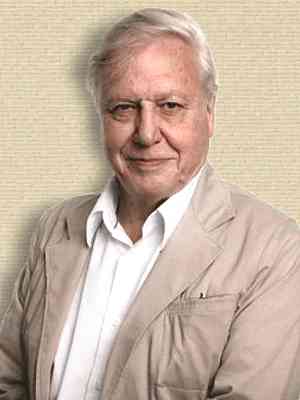
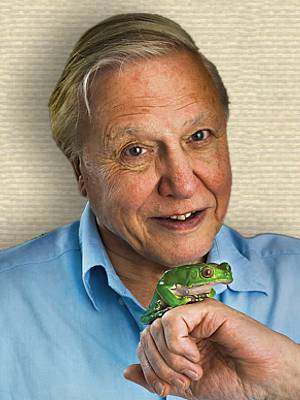
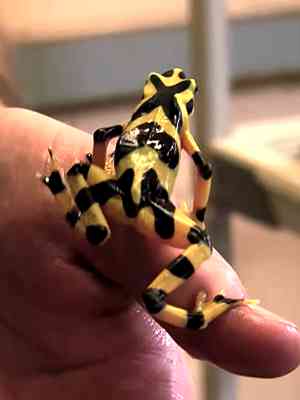
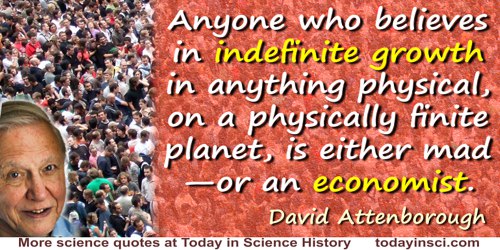
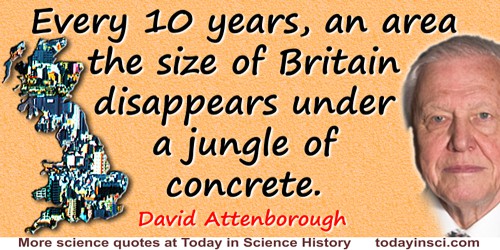
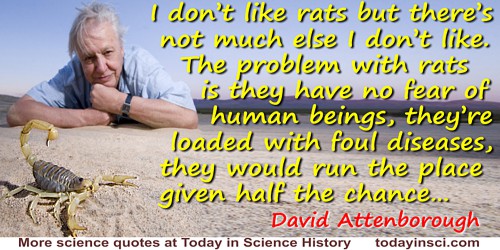
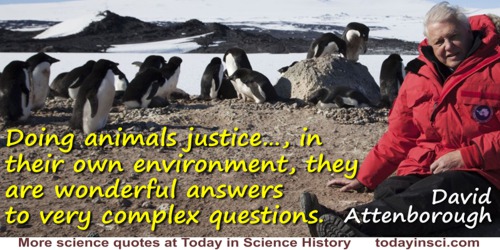
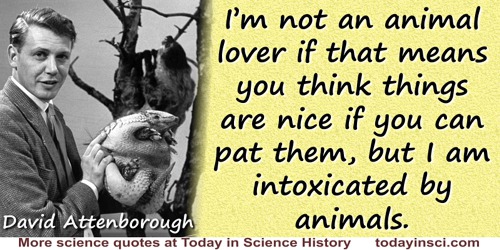
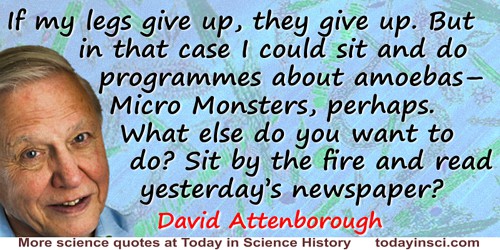
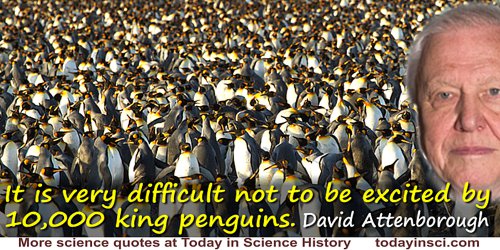
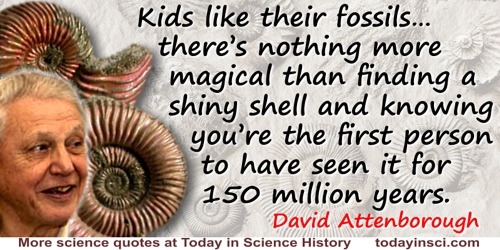
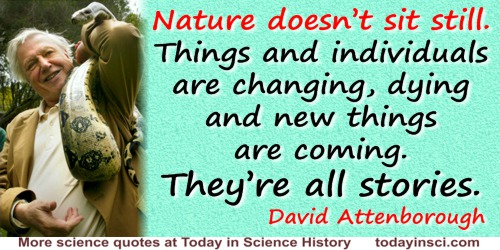
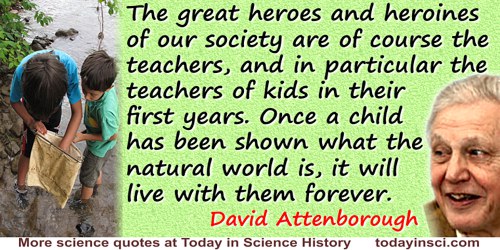
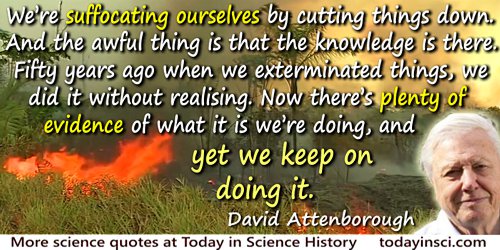
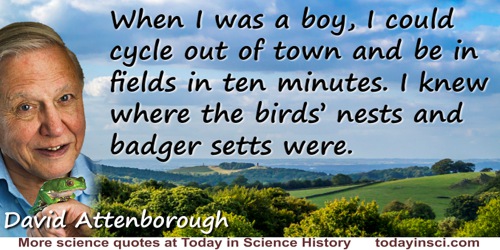
![David Attenborough quote: You’ve got to be fairly solemn [about the environment]. I mean the mere notion that there are three ti](https://todayinsci.com/A/Attenborough_David/AttenboroughDavid-Three500x250px.jpg)
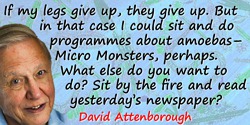
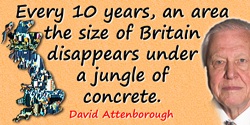
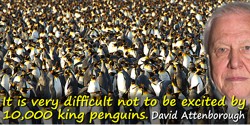
 In science it often happens that scientists say, 'You know that's a really good argument; my position is mistaken,' and then they would actually change their minds and you never hear that old view from them again. They really do it. It doesn't happen as often as it should, because scientists are human and change is sometimes painful. But it happens every day. I cannot recall the last time something like that happened in politics or religion.
(1987) --
In science it often happens that scientists say, 'You know that's a really good argument; my position is mistaken,' and then they would actually change their minds and you never hear that old view from them again. They really do it. It doesn't happen as often as it should, because scientists are human and change is sometimes painful. But it happens every day. I cannot recall the last time something like that happened in politics or religion.
(1987) -- 


